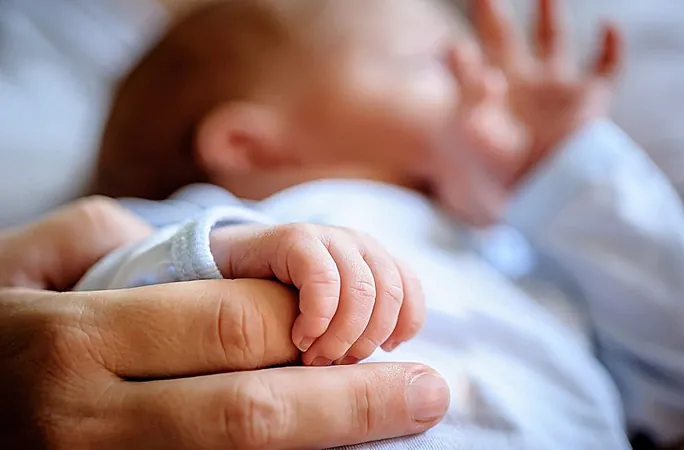
Two Infants in Louisiana Fall Victim to Whooping Cough Amid Alarming Decline in Vaccination Rates
2025-04-03
Author: Jia
Health officials are sounding the alarm as whooping cough, also known as pertussis, resurfaces with alarming force across the United States. Tragically, Louisiana has recently confirmed the deaths of two infants due to this highly contagious illness, marking the state's first fatalities from pertussis since 2018.
Dr. John Schieffelin, an associate professor of pediatrics at Tulane University, highlighted the severity of the situation, particularly for infants. "For infants, it's really rather terrifying," he said. "They experience debilitating coughing fits that prevent them from eating and drinking, often leading to pneumonia, which can require ventilator support. The coughing is relentless."
According to reports, Louisiana has documented 110 cases of pertussis this year alone, nearing the total of 154 cases for all of 2024. The situation reflects a larger, concerning trend nationwide, as the U.S. recorded over 35,000 cases of whooping cough last year— the highest number in over a decade, resulting in 10 fatalities, six of whom were infants under one year old, as per data from the U.S. Centers for Disease Control and Prevention (CDC).
Experts cite declining vaccination rates and waning immunity as primary catalysts for this resurgence. "When you start to see these outbreaks, it’s usually due to the increased circulation of the germ in the community coupled with populations that lack sufficient immunity," commented Lisa Morici, a microbiology and immunology professor at Tulane University's School of Medicine.
To combat this, the CDC recommends that children receive the diphtheria-tetanus-pertussis (DTaP) vaccine at 2, 4, 6, and 15-18 months, along with another dose at ages 4 to 6. A booster vaccine (Tdap) is advised at ages 11 or 12 and every ten years thereafter for adults. Pregnant women are particularly encouraged to receive the Tdap vaccine during their third trimester to protect their newborns, as studies indicate this practice can prevent 78% of whooping cough cases in infants and reduce hospitalizations by 91%.
In addition, Dr. Schieffelin suggests a strategy known as "cocooning," where family members and caregivers are vaccinated to shield vulnerable infants.
The waning vaccination rates pose a significant public health concern. Experts have noted a notable decline in the percentage of kindergartners receiving the DTaP vaccine, leaving many children at risk. Economic factors, including poverty and limited access to healthcare in Louisiana, exacerbate the issue. Jennifer Herricks, founder of Louisiana Families for Vaccines, pointed out that many families in the state struggle to access consistent medical care.
There are also growing concerns regarding the messaging surrounding vaccinations coming from government entities. The Louisiana Department of Health has historically backed vaccinations through community health initiatives and campaigns. However, recent shifts away from promoting mass vaccination have raised red flags among health officials.
State Surgeon General Dr. Ralph Abraham acknowledged the change in stance, stating, “While we encourage each patient to discuss the risks and benefits of vaccination with their provider, LDH will no longer promote mass vaccination.” This approach has alarmed many, including Dr. Jennifer Avegno, director of the New Orleans Health Department, who expressed concern about the ripple effects on public trust in vaccines.
Further complicating matters, Dr. Avegno worries that timely public health guidance regarding the pertussis vaccine might be lost amidst broader societal messaging. "I've been encouraged that our state Department of Health is putting out good messaging about pertussis, but I worry that it's going to get sort of lost in the shuffle," she lamented. "It's possible that it may be too little, too late."
As the nation grapples with the resurgence of whooping cough, authorities and health experts urgently call for a renewed commitment to vaccination efforts to protect the most vulnerable among us.



 Brasil (PT)
Brasil (PT)
 Canada (EN)
Canada (EN)
 Chile (ES)
Chile (ES)
 Česko (CS)
Česko (CS)
 대한민국 (KO)
대한민국 (KO)
 España (ES)
España (ES)
 France (FR)
France (FR)
 Hong Kong (EN)
Hong Kong (EN)
 Italia (IT)
Italia (IT)
 日本 (JA)
日本 (JA)
 Magyarország (HU)
Magyarország (HU)
 Norge (NO)
Norge (NO)
 Polska (PL)
Polska (PL)
 Schweiz (DE)
Schweiz (DE)
 Singapore (EN)
Singapore (EN)
 Sverige (SV)
Sverige (SV)
 Suomi (FI)
Suomi (FI)
 Türkiye (TR)
Türkiye (TR)
 الإمارات العربية المتحدة (AR)
الإمارات العربية المتحدة (AR)